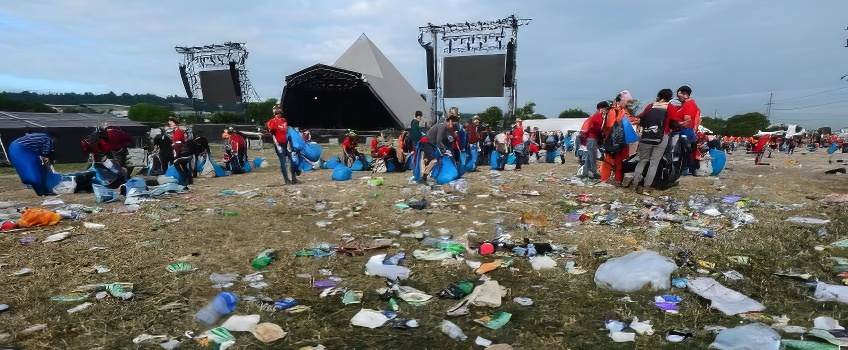Student Research Creating Greater Awareness on Music Festival Environmental Impacts
By Noel Criscione-Naylor, Associate Professor of Hospitality & Tourism Management Studies, Stockton University
Noel Criscione-Naylor, EdD
Associate Professor of Hospitality & Tourism Management Studies, School of Business, Stockton University
Maggie Brennan, a Senior Psychology Major with an Integrative Health Minor, discovered a keen interest in events and research. Following her enrollment in GSS 3209 Bucket List Events, taught by Dr. Noel Criscione-Naylor, Associate Professor, and Chair of Hospitality, Tourism, and Event Management, Maggie began to explore the multifaceted perspectives surrounding large-scale events and festivals. Subsequently, in GEN 2240 Introduction to Research under the guidance of Adjunct Professor Melissa Holzman in the School of General Studies, Maggie narrowed her focus and took a deeper dive into researching the environmental impact of waste production at music festivals.
Music festivals and celebrations often unite people, crafting enduring memories. Music festivals draw together multitudes sharing common interests, fostering unique environments dedicated to celebrating diverse music genres. These festivals offer individuals a chance to forge indelible moments. However, amid these cherished experiences, there lies a lasting impact on the environment. Annually, music festivals generate immense volumes of waste, leaving a substantial ecological footprint. The convergence of thousands over several days from various corners of the globe results in substantial waste production. This waste poses environmental threats due to improper disposal practices and excessive production of disposable items. While the celebration of music remains pivotal to society, its toll on the environment manifests through single-use disposables, food waste, residual refuse, and carbon emissions.
“Music festivals are outdoor multi-day ticketed events involving musical performances, as well as providing food, drinks, merchandise, and activities. Not every music festival is the same. Each one celebrates different music genres and performers with different venues and themes. Music festivals have two important roles in society: being an economic resource and bringing people together,” Maggie describes. Furthermore, music festivals can be held anywhere, which has become a significant resource for local economics through a variety of economic stimuli, such as purchasing food, drinks, hotels, and transportation fees.
As part of Maggie’s research, she gathered a variety of resources and data that focused on the overabundance of waste generated at music festivals. She noted that Bosser-Carenys (2021) categorized generated waste at music festivals as: organic waste, paper and plastic waste, wooden waste, and residual waste. Organic waste is generated from food and drinks, which are essential to feed attendees, staff, and musicians and take the form of paper and plastic waste. Wooden waste encompasses the diverse infrastructure elements and thematic embellishments tailored for each music festival, comprising signs, décor, stages, and various activity zones, enhancing the festival's ambiance, and crafting memorable experiences. Residual waste encompasses nonrecyclable items brought by festival attendees, spanning clothing, tents, cigarette remnants, and leftover food. Categorizing the waste generated at music festivals aids in discerning the various types produced and quantifying the volume within each category.
TYPES OF WASTE PRODUCED AT MUSIC FESTIVALS
As reported in Maggie’s research, nearly 23,500 tons of plastic waste is produced annually at music festivals in both the United States and United Kingdom. A nonprofit organization, Powerful Thinking, collected data of waste generated from music festivals in the United Kingdom during a five-year period and reported roughly six pounds of waste is generated per person per day at a music festival. Another report by the Association of Independent Festivals (2018) discovered nearly 10% of tents are abandoned by attendees at music festivals translating to nearly 875 tons of plastic waste annually. Overall, the plethora of waste generated at music festivals has a harmful impact on the environment.
The pollution created by music festivals harms wildlife and ecosystems. For example, she described music festivals being held in natural environments, such as on beaches, can damage the local ecosystems, habitats and vegetation through the crowds of attendees and temporary infrastructure for the festival. Additionally, she noted carbon emissions increase due to transportation and power generation for music festivals. The environmental impact of traveling audiences on the environment produces nearly 231,000 carbon emissions annually. Energy used for lighting, video, production, and many other things at music festivals accounts for about 65% of energy waste further contributing to carbon emissions production (“The Show Must Go On”, 2018). Becoming environmentally friendly will significantly reduce the environmental impacts of music festivals, however there are many barriers preventing music festivals from doing so. Mair and Laing (2012) discuss these barriers including finances, lack of support from stakeholders, lack of time, and availability of sustainable suppliers. Acknowledging these obstacles and the environmental repercussions of such events underscores the pressing necessity for change. As with any change, generating awareness of the profound issue is step one.
References
Association of Independent Festivals. (2018) Ten-year report. Available at: https://aiforg.com/wp-content/uploads/AIF-Ten-Year-Report.pdf (Accessed 25 October 2023).
Bosser Carenys, M. (2021). Environmental implications of zero-waste music festivals (master’s thesis). (Accessed 23 October 2023).
Mair, J., & Laing, J. (2012). The greening of music festivals: motivations, barriers and outcomes. Applying the Mair and Jago model. Journal of Sustainable Tourism, 20(5), 683–700. https://doi.org/10.1080/09669582.2011.636819
The show must go on report. Powerful Thinking. (2018, April 27). https://www.powerful-thinking.org.uk/resources/the-show-must-go-on-report/ (Accessed 20 October 2023).





